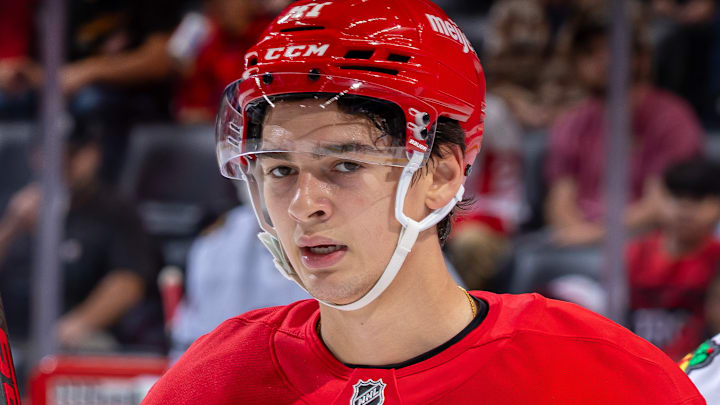The Detroit Red Wings offered little to cheer about in their 2–1 loss to the Pittsburgh Penguins on Monday night at Little Caesars Arena. Yet amid an otherwise forgettable performance, head coach Todd McLellan singled out one notable exception: Carter Bear, the organization’s 2025 first-round draft pick.
"He's involved in the game consistently, night after night," McLellan said of Bear. "As he grows and matures, he's going to get stronger and stronger, and those battles for him are going to be - not that he didn't win his battles tonight, but they'll be even more winnable because he'll be stronger. A very smart player. Mother Nature will help him, and he's going to work hard and he'll be a heck of a player."
Carter Bear is the real deal
At just 18, Bear is only beginning to sample the rhythms of NHL competition, yet he looked anything but tentative on Monday night at Little Caesars Arena. Matched up against Pittsburgh defenseman Ryan Graves, he held his own in the physical battles and refused to fade from the play. The performance did not go unnoticed. McLellan, rarely quick to offer public praise, described him as a “heck of a player”—a succinct endorsement that carried considerable weight coming from a coach of his temperament.
Bear inevitably draws comparisons to Alexander Ovechkin. To be clear, no one is anointing him as the next Ovi just yet, but the similarities are difficult to ignore. Like Ovechkin in his early years, Bear couples a natural scoring touch with a willingness to impose himself physically. His 40-goal campaign with the Everett Silvertips in the Western Hockey League underscored his offensive instincts, while his 77 penalty minutes—second overall—revealed an edge that refuses to yield ground.
That combination has become increasingly rare in modern hockey, where players are often categorized as either pure scorers or enforcers. Bear resists such compartmentalization. Named to the WHL’s Western Conference Second All-Star Team, he is establishing himself as a forward who refuses to be defined by others’ expectations. He plays on his own terms—fearless, unbothered, and unapologetically direct.
"I'm just trying to play my game," Bear said. "I don't care who I'm against, I'm just gonna try to play my game against them."
McLellan is very much an old-school coach. He is unflinching in his critiques, unwilling to indulge mistakes, and never one to dispense hollow praise through the press. Yet when he does identify authentic, top-tier talent, he does not hesitate to make that recognition public. That Bear has already earned such acknowledgment is telling. It reflects not only his technical skill but also his discipline, his leadership qualities, and an unrelenting drive that separates promising prospects from established professionals.
What makes this ascent even more compelling is the context: Bear is returning from a serious Achilles injury, the sort of setback that derails careers more often than it sustains them. His response has been less about rehabilitation in the narrow sense and more about projection—a clear statement that he wants to seize this opportunity fully. For a coach like McLellan, who values intent and character as much as execution, that determination is as important as any on-ice statistic.
And when you circle back to the Ovechkin comparison, it does make sense. The sport has seen Russian athletes lean into larger-than-life imagery before—wrestling bears. Now, in a twist of fate, the Red Wings quite literally have their own Bear.
